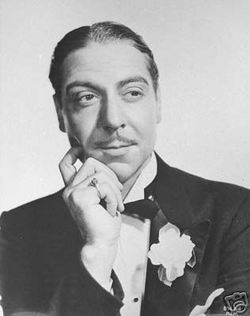Joseph Calleia (Joseph Alexander Caesar Herstall Vincent Calleja Calleja)

Joseph Calleia was born in Notabile in the Crown Colony of Malta on August 4, 1897. His father was an architect. Calleia studied at St. Julian’s and St. Aloysius Colleges. At age 12 he used the English pound given to him for Christmas to buy two dozen harmonicas, and organized a local band whose performances were soon netting £100 a week. Sent by his father to London to study engineering, Calleia employed his good tenor voice in music halls, performing ballads of the Scottish Highlands in traditional dress. He worked as Joseph Spurin, using his mother’s maiden name due to his father’s disapproval. In 1914 Calleia joined the British Transport Service. After cruising the world for two-and-a-half years, his ship was torpedoed in the English Channel. Hospitalized for three months, Calleia was awarded a campaign medal and honorably discharged. He traveled to the United States in 1917. Unemployed, he sang for the Red Cross and armed services, and volunteered for the American Tank Corps. Joseph Calleia began his stage career on Armistice Day. After World War I he found only limited success in vaudeville. He earned his living stoking the furnace at a department store, and got a night job washing and repairing New York City streetcars. By day he haunted theatrical booking offices. The Henry W. Savage agency sent Calleia to Denver, where he made his stage debut singing in the chorus of the musical comedy, Have a Heart. The following season he had a bit part in Pietro (1920), an Otis Skinner vehicle that played six weeks on Broadway and 40 weeks on tour. Calleia supplemented his salary by working as assistant stage manager and repairing trunks at $3 each.
Joseph Calleia’s first speaking role on the stage was in The Broken Wing (1920), a Broadway comedy starring George Abbott and Louis Wolheim. He understudied all of the parts and appeared as a Mexican peon who played the guitar and sang a song called “Adelai”. Calleia composed the tune, and asked Abbott to write the lyrics; the song was published and eventually brought each of them royalties of as much as $2,000 a year. The Broken Wing was a hit, and after the play’s New York run Calleia and Thurston Hall were carried over in a London production. After four months the show closed and Calleia visited Malta, where he and his father reconciled. At his father’s request he began using his real surname, and was billed as Joseph Spurin-Calleia. On February 14, 1925, Calleia made his concert debut at Town Hall in New York City, accompanied by pianist Ferdinand Greenwald. “He proved to be the possessor of an agreeable high voice, which he used with much skill in Italian airs,” wrote New York Times music critic Olin Downes, “including that of Rodolfo from Puccini’s La Boheme and others from Verdi’s Trovatore and Rigoletto.” In recital at New York’s Steinway Hall on February 21, 1926, Calleia “displayed a voice of pleasant and attractive timbre” in a program that included works by Scarlatti, Paisiello, Schumann, Gounod and Leoncavallo, as well as two of his own compositions.
Joseph Calleia was cast as the Spanish ambassador in the Broadway production of Princess Flavia (1925), Sigmund Romberg’s musical adaptation of The Prisoner of Zenda. While he was waiting for the elaborate production to be mounted he sold pianos, with such success that the store owner offered him a store of his own if he would stay. In 1926 Calleia was given his first prominent stage role, in George Abbott and Philip Dunning’s smash hit, Broadway. He played a shuffling, coin-jingling waiter in the melodrama that New York Times critic Brooks Atkinson later called a “noisy, bustling cyclorama of backstage life [that] remains a landmark in the American theater.” Calleia also acted as the company’s stage manager and, working for producer Jed Harris, he supervised some ten duplicate productions of Broadway in the U.S. and abroad. A succession of acclaimed performances in successful Broadway plays followed, including a shiftless newspaper reporter in The Front Page (1928), a convicted murderer in The Last Mile (1930), and the chauffeur in Grand Hotel (1930). Calleia became a star with Small Miracle (1934) — a Broadway production described by The New Yorker as “a very satisfactory melodrama with Joseph Spurin-Calleia as the pleasantest murderer you ever saw.”
Joseph Calleia had made three feature films on the East Coast in 1931–32; the acclaim he received from Small Miracle brought him a contract with Metro-Goldwyn-Mayer. He quickly made his mark in Hollywood, playing the role of a criminal in Public Hero No. 1 (1935), followed by Riffraff (1936), with Jean Harlow and Spencer Tracy. In 1936, Calleia co-wrote the screenplay for Robin Hood of El Dorado. In 1943, he played El Sordo in For Whom The Bell Tolls. Joseph Calleia retired in 1963 and died in Sliema, Malta, on October 31, 1975, aged 78. He was interred in the family vault at Santa Maria Addolorata Cemetery in Paola.
Born
- August, 04, 1897
- Notabile, Malta
Died
- October, 31, 1975
- Sliema, Malta
Cemetery
- Santa Maria Addolorata Cemetery
- Paola, Malta



